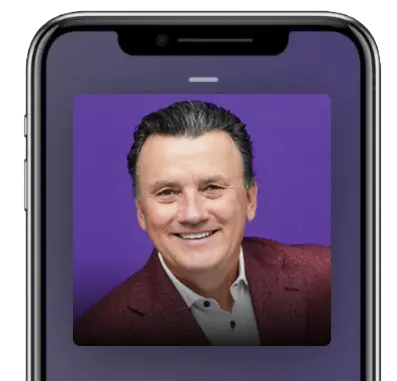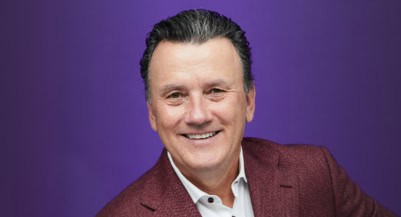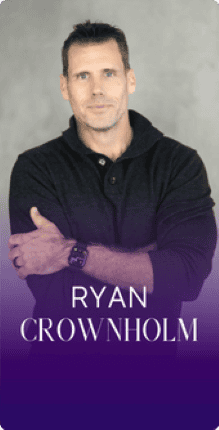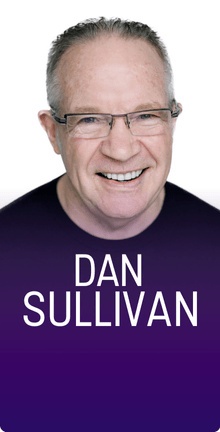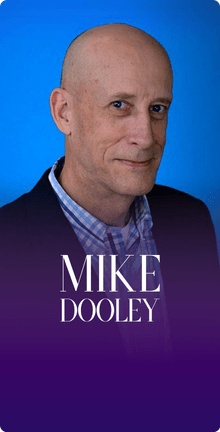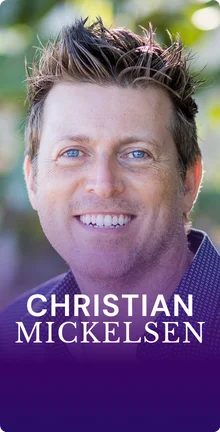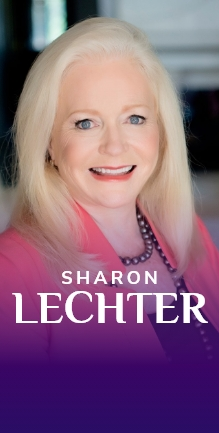In this Episode
- [02:31]Richard Robbins recounts his early career path, from working with his father to launching his real estate business in Toronto.
- [05:40]Richard credits mentor Jim Rohn for transforming his mindset by focusing on making a lasting impact.
- [12:12]Richard underscores the role of accountability and community in client retention through his coaching program.
- [15:07]Richard explores how personal growth has fueled both his business success and life fulfillment.
- [18:30]Richard discusses various tools and techniques he has developed, including the living legacy document and the Be-Do-Have theory.
- [23:36]Richard illustrates his legacy philosophy with personal statements from his own document.
- [30:57]Richard reflects on how admired figures have shaped his evolution as a leader and entrepreneur.
- [34:34]Richard shares a meaningful lesson from Jewish wisdom: “Man plans and God laughs,” taught by his friend David Black.
- [40:25]Stephan offers insight on the value of keeping blessings under wraps to avoid inviting negative energy and jealousy.
- [41:47]Richard reveals the books that most profoundly influenced his thinking and leadership.
- [44:01]Richard champions the transformative power of giving for both the giver and the wider world.
Richard, it’s so great to have you on the show.
Stephan, it’s great to be here. Every time I hear that intro, I think to myself, “I’ve got to send that to my mother. She’d be so proud.”
Let’s talk about your origin story, because you’re a superhero, having had half a million people attend your events and learning and growing from you. You somehow ended up in the real estate world and became an expert that many people look up to. But it didn’t happen by accident, or did it?
Well, to be honest, a lot of it was by accident, but it was an interesting journey. So, Coles Notes are, I’m from a small town about 90 minutes northeast of Toronto called Peterborough, and I was born and raised there. When I was 24 years old, I got my real estate license. Before that, I worked for my father. My father had three service stations—gas service stations, all that sort of thing.
I used to drive by this Century 21 office all the time, and they always seemed to be dressed nicely, and they had nice cars. I wouldn’t mind selling houses. That sounds sort of fun. So anyway, I got my license and sold in Peterborough for three years, until I was 27. I started when I was 24, then moved to Toronto, where I live. I opened a real estate company. I didn’t know anybody, and I should do it with my partner, Dana Richard, at the time.
Hope of a better future is an incredible feeling. It's such a force inside a human being when they have hope. Share on XThe first couple of years, as a story, were born on one credit card to pay for another credit card. You know, the old story about starting with no budget. After a few years, we started to figure some things out. Actually, Jim Rohn, who was one of my mentors, I went to one of his seminars. He changed my way of thinking. Then, we grew a real estate company to have the highest production per agent of any company in the trading area by three.
It was a big number, accomplished through coaching and training my agents. I started teaching them the best practices. I started holding them accountable for certain actions. Then, when I hit it with 38, 11 years after I started it, I thought, “Well, I could do this with more people, right?” I just do it in my office, and then I sell my company, and I start the company we now have, and so we’ve been doing it. We’re 26 years old, really hard to believe.
I was taking the principles that I had been teaching my agents in my office, and so I’m going to take them to a bigger audience. That’s how it all started, believe it or not. Our primary business is coaching. Our coaches do about 651 one-on-one calls a week with our coaching members, and we still do large public events. I do a lot of keynoting, so that’s the Coles Notes of how this whole thing started.
My wife’s very involved. She runs a company. She looks after all the operations, and I will say, without her, there would be no company, because she holds it all together. But it’s been an amazing journey, and I feel so blessed to get to work in the real estate space because I was there. I understand their challenges, frustrations, and disappointments, and I have a soft spot in my heart for the people in the industry, so I’ve just chosen to stay in real estate, and this is where I will end, whenever that may be.

You mentioned that your mentor changed your thinking, and your business grew. What changed?
Well, we suffered when we first opened the company. We’re probably two years in, and somebody introduced me to Jim Rohn, who became one of the most influential people in my life regarding business strategies. Jim has since passed. He was having a seminar in Dallas, and we didn’t have much money, but my partner, Dana, said, “You know, you should be down to that seminar.” I said, “Okay,” I got a ticket and booked a flight.
I couldn’t even afford to stay at the hotel. It was at the Marriott Hotel in Dallas, so I had to keep down the road somewhere, only six or seven walks are allowed behind your door. I wasn’t exactly in the good part of town, but I showed the seminars to 1000s of people. I had 3000 people there. He had a lot of speakers there as well, Zig Ziglar was there, and people like that. He said that money is an exchange of value.
I remember when he said that, I thought for a minute, “I don’t know, I’m feeling like I’m working hard and providing a lot of value. Why am I not making a lot of money?”
He said that the challenge with most people is that they’re always thinking about making money, but they’re not thinking about impacting the people, and they want to pay them in a really deep way. He went on to explain it, and something became clear to me at that moment: we were thinking a lot about making money because we didn’t have any. We’re trying to figure out how to pay the bills, and of course, for many entrepreneurs, that’s a primary thought.
Learning plus action leads to change.
But what I wasn’t doing enough of was investing enough of my time, effort, and energy into the people, my customers. When I flew back, I told my partner, Dana, that if we help, our agents do way better financially if we can help them be financially successful and live a good life. I said, obviously, the more business they do, the more we make, and that sort of thing. We put a training program in place. A coaching program is really what it was.
They didn’t call it coaching back then, but it was a coaching program. My theory was that if I could find the best practices used in the industry or by my people, an example would be lead generation marketing. So let’s say somebody has built this crazy good business and gets all of these referrals, but why do people keep sending them business? I would find people doing something really well and get them to share with my people.
Then, we would create an action list of, “Okay, so based on what you’ve learned, what will you do?” Everybody could create their own action list. Then every week, we review that with them and hold them accountable to some degree to those actions, because learning plus action leads to change. My theory was that if I could help them learn something new, it didn’t mean I knew the answer. I had to find people who knew the answer.
If I could help them learn something new and hold them accountable to that, so they’re taking new action, they will start producing better results. That was a whole formula. Jim taught me to stop thinking about just making money and start thinking about deeply investing in my customers, helping them become ultra successful, if you will. Of course, when we built it up and our agents were three times more productive, everybody knocked at our door.
I need to constantly be learning and discovering what it is that I don’t know.
Everybody wanted to work for us, and our agents were doing very well, and of course, I was getting a piece of all that. Business has started to take off, and it’s so funny because you don’t know what you don’t know, right? I discovered I didn’t know many things when I went to that seminar. I would say, before that seminar, a young guy, a little bit cocky, probably thought I sort of knew it all, which isn’t uncommon when you’re in your late 20s, maybe at 30 years old, it opened my eyes.
From that day forward, that was the first seminar of my life. From that day forward, I became a personal development junkie, and I thought to myself, I need to constantly be learning and discovering what it is that I don’t know. Then, once they have done that, how can I take that idea or take that person as an example and have them share that with the people I’m working for?
You mentioned that you got a piece of what every salesperson or agent reporting to you brought in. Did you bring some of that remuneration model to your coaching practice, and what you do now? Do you get a piece of every sale made with your clientele, or are you just paid a flat fee?
No, it’s a flat fee. We have several programs in our company. Now, I don’t do any one-on-one coaching anymore. I haven’t coached in 15 or 16 years, but no, it’s just a flat fee they pay us monthly or annually, depending on how I want to pay it. The one-on-one coaching, to me, is where the accountability comes from. That’s where you and I would have a conversation every couple of weeks. If you’re my coach, you will explore how my last two weeks went—what went well, what didn’t, and what didn’t get done- and have a casual conversation about that.
We can all learn better ways by providing subtle accountability, where we feel somebody’s in our corner.
Once we get through that sort of overcoming the challenges to implementation, if you will, we’re going to talk about what we want to accomplish in the next two weeks. That’s the one-on-one coaching component of it. However, that coaching component is not as much about teaching. What we do is we have calls regularly, and also a portal, we’ve got thousands and thousands of hours of material in the portal that you want to learn anything about the real estate industry, financial management, budgeting, what you should spend in marketing, etc.
You can watch all kinds of content we’ve developed over the years. But then, what I still do is find experts. So you would know Evan Carmichael, I’m sure. Evan Carmichael is a member of the Genius Network. Well, I just had Evan Carmichael do over two teaching sessions on YouTube. So I’m always trying to find people who are good at what they do, and then I’ll put them in front of my coaching members.
I might know somebody who knows a few things about SEO.
Exactly right. If I take the teaching component, the learning component, and I can introduce them to that, and all of our coaches are always on those calls as well, and then if the coaches can work with those people and just help them say, do 5% more than they normally would. Well, you’re going to produce a better result when your life and a lot of people always say, “Well, what do you think is the secret sauce?”
From a learning standpoint, we can all learn better ways. You go on YouTube and learn better ways, but the secret sauce is providing subtle accountability, where they feel like somebody’s in their corner. Somebody’s there for them. It’s not a master-slave relationship by any stretch of the imagination. It’s more of a relationship; we will work together, and keep trying to guide them in the right direction and get them to take new and better action.

If they take new and better action, they will produce better results. Of course, when they do that, they don’t leave our program, like I’ve had people in our coaching program for over 20 years, and they’re still there. The average person stays in our coaching program for six years, and a large part of that is because we have built a community. We have a community of people in the portal.
They can share their struggle with something and put it in the portal, and other members will talk about how to fix that sort of thing. They got the learning, they got the accountability, and then they got the community. The community is a big part of it because they feel like they are part of something. They feel like they have friends. In the real estate industry, you could work in the same office, but technically, you could be chasing the same business.
So, inside the office, it tends to be a competitive environment rather than collaborative. We’ve created that environment where other agents, even though they’re all in the same business, will help and share, which is pretty cool.
Do you have in-person events where they get to bond and hang out with some of their colleagues?
The average person stays in our coaching program for six years, and a large part of that is because we have built a community.
This year, we’ve got an event in Vancouver last February, and then Calgary and Edmonton in March. Then we have a members’ retreat every year where our coaching members get together. We’re going to Halifax this year for that, we spend three days together, primarily mornings are learning, afternoons for excursions where they can build community and get to know and hang out with each other, giggle and laugh, and have some fun.
Then, at the end of November, our signature event is held annually. It’s called Master’s Academy. We have about 1,100 people there for two days. Joe Polish spoke at one of my events. We try to get some big names and that sort of thing. We have several events throughout the year, and the events are twofold. Number one, they’re for our members. Because they attend many of these events, we also sell tickets to them. It also becomes a sales channel for our coaching program because people come to the event and hang out with all these coaching members.
Do you know what I mean? They go, “This is pretty cool stuff.” And then they join our program. We are also blessed that last year, 62% of our business came from client referrals. Our clients are also strong advocates to a large degree. To me, it’s the best business in the world. When the rest of the world tells everybody about you, it’s a lot easier than spending a bunch of money on advertising.
It’s impressive that you were able to take something that was a personal passion of yours. I’m not talking about real estate, I’m talking about personal development, your self-described personal development junkie, and make a business model out of that, and turn that into something that has been going and growing for 26 years. That’s cool.
When the rest of the world tells everybody about you, it’s a lot easier than spending a bunch of money on advertising.
It is really cool. I’m 63 years old now. A lot of people ask me, “When are you going to retire?” I said, “Well, I have no plans to retire.” What do I retire to? I like what I do every day. So if I like what I do, why wouldn’t I keep doing it? You’re right, I’m blessed by the fact that I get into the personal development world, have learned so much, and still love to learn. Every morning, I spend 60 minutes reading before I start my day, and it gets me jacked up.
I get so excited about a new idea or possibility. There’s an old saying that says, “Hope is the most powerful force in the world.” I believe that the hope of a better future is an incredible feeling. It’s such a force inside a human being when they have hope. These ideas always give me hope, and they get me fired up, and then I think, “How can I share that? How can I take that concept?” I develop a lot of tools, if you will.
I was working on a tool just before we got on this call, and so I’ll read a new idea, and I turn the idea into a tool, right, a focusing tool that our clients can use, or we can use as a marketing piece. People can sort of go through the tool, and by the time they’re done, they go, “Okay, I get it now.” I love that I could sit and develop concepts and tools all day. It boils down to the fact that if you get to do something that you love to do all day, and then you can surround yourself with people who have talents that are not yours, if you want to build something bigger, if everybody can just stay in their lane, it’s amazing what can happen.
I’ve had staff living with me for over 20 years. My wife is good at operations. I’m terrible at operations. I just can’t deal with the urgency of operations. I have to have more peace in my life, and work on projects that get me going. I love to speak and give a keynote. I really enjoy that. If you get to spend all your day doing what you really love to do, and if you can surround yourself with good people, and you’ve heard all this before, the things that you’re not good at, and then just sort of be the visionary and lead them in the right direction, it’s quite amazing what can happen.
Giving is high energy, getting is low energy. When you do something for somebody else out of the goodness of your heart, you feel better. Share on XWhat’s your Kolbe score?
Oh, I don’t know. I did it one day. I don’t know what it is. Quick start’s one, isn’t it?
Quick start is one of the metrics. Mine is a 9 out of 10. I’m up there.
Like I’ve always said, I remember being a high, quick start. My wife says, “You’re a great starter and a terrible finisher.” In other words, I created a tool this morning, and all I do is get it all laid out. It’s an absolute mess, and then I send it to graphics design. I can get it there, but it’d be difficult if I had to follow the process all the way through.
I can relate. What are some of your most successful tools that have had the most impact on your membership?
I have a series of tools. I designed something called the living legacy document, which came from many different seminars I’ve attended over the years. I have this theory that we wake up in the morning and spend more time getting ready physically than we do getting ready mentally. We get up, and we’ll have a shower, brush our teeth, or do whatever it is. We get ready physically. But how much time do we spend getting ready mentally?
I have this theory that when we wake up in the morning, we spend more time getting ready physically than we do getting ready mentally.
I’m going to suggest, in most cases, for most people, it’s not that much time. I started thinking about this concept of legacy, and I think we all want to have a good legacy. The question that I asked my clients, if somebody was giving a eulogy of you, what do you want them to say, and then once you’ve written the eulogy, and there’s many tools that I’ve created to help you create that it takes quite a while, then are you living in line with what you’ve written? Is that the message you leave when you’re gone, whether for your kids, grandkids, clients, friends, or whatever?
Something that I do every year is I take on X number of clients, and we meet in groups once a month, and I teach them how to create a living legacy over 12 months. At the end of 12 months, their document is done. Now it’s a dynamic document, right? In other words, it’s always changing. When I get up in the morning, one of the first things I do is call it R and R time, review and reflection time. The minute I get up, I first make a coffee.
The second thing I do is sit in my favorite spot and review my living legacy, always changing it, critiquing it, and having fun with it. I review different parts on different days, which gets me charged, like I’m reading. I read this study once, I can’t remember the exact one, but it said one of the main reasons people don’t achieve their goals is because they forget them. They wake up every day, and just start, and we live in this world of urgencies.
We live in this world where we’re checking our text, emails, and everything else, and if you really think about it, if all you’re doing is responding all day long, you’re helping everybody else achieve their goals, but are you achieving yours? It’s easy to live in the world of urgency. It’s a lazy way to live, but it keeps you busy. Busyness doesn’t necessarily mean you’re moving in the direction you want. The whole idea of the document is whether you’ve got your values, goals, and dream list.
One of the main reasons people don’t achieve their goals is that they forget them.
There are some affirmations in there. You create a list of the 10 people you admire the most that you don’t know, because chances are, you want to be more like those people. Over the course of 12 months, I worked with a group of people. Every year, I set it up, and they work with me directly in groups of 60; they go through all these tools. Almost everybody who goes through it just, in the end, goes, “Wow, that was an amazing experience.”
It comes from the concept, and said, “Okay, let’s get it on paper. What is my legacy? What do I want people to say about me? How do I need to live so I can create that legacy? That’s what I want people to say about me. I need to live that way. I need to be that person, whoever that person is.” Then you say, “Well, how do I do that?” “Well, let’s create a document called your living legacy that you keep reminding yourself regularly so you don’t get caught up in the urgent.” We’re all on and off track all the time.
That’s how you go through the world, and you’re okay. I’m doing well. Then, I’m off to the left, and I’m off to the right. The way I look at this tool, it just helps guide you back on the right, because the more often you get reminded of something, probably the better habit you’re going to develop in terms of your playing and everything else, sort of allows you not to forget, because I think it’s almost more important sometimes to be reminded than it is to be taught something new. That’s probably the document I would say has had the most impact. That’s got nothing to do with real estate.
Well, it seems like it could be relevant to anybody and everybody, and that should be something that you release to the world, and get millions of people who have nothing to do with real estate doing it.
Yes, and I’m writing that down right now. “Release to the world.” Thank you. It’s truly my passion. That’s what fires me up. It’s so much fun to develop these things, and it’s all hairy fairy stuff, and that’s cool, right? It’s not their thing, but it’s my thing.
The more often you get reminded of something, the better habit you’re going to develop, and it sort of allows you not to forget.
Cool. What’s your living legacy document look like? Is it a one-pager? What are some of the statements included in your living legacy?
My living legacy is many, many, many pages. What I’m going to do right now, because I’m on my computer, I’ll just mention some of them to you. One part of the living legacy that I use is called “what I know.” What I know are statements I know to be true, and sometimes I’m not fully on track. It keeps reminding me. Tim Ferriss once said, “The struggle ends when the gratitude begins.” Basically, what I know as my guiding principles. I’ll just run through a couple with you for fun.
But number one is, “Inspired, not impressed.” I learned that when I first started speaking, 26 years ago. I used to have some speaking engagements, Stephan, that were so good. I killed it, man. When I say I killed it, what I mean by that is the audience was energized. They were into it. I had the attention. I could tell they were getting it. Then I had these other ones that were never any good. It was the same content, which was a weird thing.
When I finished speaking, my hands would be cold, and I would be cold. When I finished a good one, my hands would be sweaty. I’d be warm. I could tell there’s a disconnect from the audience. I went back to Jim Rohn because I started attending all of Jim’s seminars. After that original Dallas one, I walked up to Jim one time. I had the good fortune of meeting him a few times and said, “Jim, I have a question for you.”
He said, “What’s that?” I said, “Sometimes when I speak, I feel so connected. It’s working so well.” Then I said, “Sometimes it’s like I’m so disconnected, and struggling with the talk, and the audience is not connected.” He looked at me right away. He said, “That’s because sometimes you’re trying to inspire and other times you’re trying to impress.” I said, “What do you mean?”
Busyness doesn’t necessarily mean you’re moving in the direction you want.
He said, “Well, think about this. When you’re trying to inspire somebody, you’re thinking about them, aren’t you, but when you’re trying to impress somebody, you’re thinking about yourself. When you feel you’re a little off, you get in your head and start thinking about yourself. You’re worried about your delivery, you’re worried about not being embarrassed, and all those sorts of things.”
He goes, “Here’s what’s cool. If you get up there every day, all you want to do is say something that will make a difference for the audience. It’s not about you anymore, and you probably make tons of mistakes, but it doesn’t matter. The audience will be cool with that because they can feel your energy is about them.” It was 22 years ago, or whenever he told me this. I don’t say this in a bragging way.
I have never had a bad speaking engagement since now, I’ve had some of the weird shit happen to me. I’ve fallen off stages. I’ve had the curtains fall behind me. I’ve screwed things up, but I laugh about it now, because I don’t care. I’m not trying to impress. I go, “That was super weird.” I look at the eye and go, “Wow. I can’t believe what that said, where’d that come from?” They laugh because I’m making fun of myself instead of trying to be perfect. I have a bit of a perfectionist mindset that I needed to overcome.
Then another one that I use is called “Deliver the Unexpected.” We call it DTU-ing, which is sort of unexpected. I actually wrote a book called Deliver the Unexpected. As a company, we’re always trying to deliver the unexpected. We want to do something for our clients. They go, “Whoa, how did you ever figure that out?” Another one is progress, not perfection, because I’m a recovering perfectionist. Make progress every day.
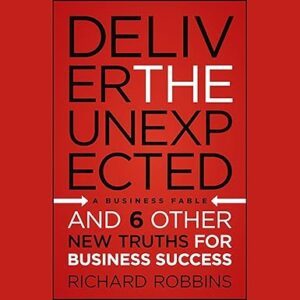
Another is Dan Sullivan saying, “In charge, not in control.” If I’m a perfectionist, I want to control everything, I gotta focus on being in charge. Another one is, “Owning everything, but nothing owns me.” In other words, I don’t want many things in my life. When I started making a lot of money, I sort of get into this space where I was into stuff, like watches, and they’re all just a pain in the ass because everything you own owns a PCU.
If you get two cars instead of one, you get two to look after. Those cars own a piece of you. I’m in Florida right now. I spend my winters in Florida. I do have a couple of houses, but they’re simple. I was in that for a while, and it became peaceful when I got out, if that makes sense. Another one I always say, “It’s better to innovate than compete.”
You don’t need to compete against people. Just go and innovate and try to go a little better. I think that’s another strategic coach. Another one is, “Don’t hire people. Invest in people who believe in what we do.” If you don’t believe in what we do, it doesn’t matter how good you are. That is one example of one page in my living legacy.
How many pages do you have?
I got 13 pages. You know, I got my example. My purpose would be the first page.? My purpose is to ignite lives by lighting a fire within people. I don’t want to light a fire under people. I want to light a fire in them, if you know what I mean. Then it goes on. It talks a little bit about saying that I encourage others to believe in themselves and see the amazing possibilities, which provides hope of a better future, which I believe is the most powerful force in the world.
I’m not saying I read that every day, but there are days I need to read that. There are days when I get so caught up and want to produce a result, and I go, “Okay, Rich, get away from the result. Just ignite lives. Make a difference in people’s lives. They will become advocates if you do that.” Another document I put in there is “What do I want?” In other words, not what I need. When I think about what I want, I think it’s driven by freedom.
You don’t need to compete against people. Just innovate and try to go a little better.
Then, when I think about what I need, it’s like I’m trying to solve my problems, financial needs, or whatever it is. One thing I want is slow mornings. I want to do R and R time. I want to do a workout. I want no appointments until 10 o’clock. That’s what I want at this stage of my life. Something I want is to be able to relax and enjoy the journey. No rushing. Life is a journey. It’s not a destination. I want the freedom to do things I’m good at and spend 80% of my time there.
I want to create amazing memories for my kids and grandkids because I believe a great life is made up of great memories. Something else I want—this sounds maybe a little selfish—is to fly first class all the time. I’ve flown over 2 million miles, and I’m done sitting in the back of a plane. For somebody starting a business, I can’t do that. It’s important to me because I want to feel relaxed. I want to enjoy the journey. I’m not going to enjoy the journey sitting in the middle seat.
I want to ignite lives by providing hope of a better future. That’d be an example of another page that can get updated and changed all the time. That’s sort of the type of stuff it is. I would like to talk about the people I admire.
I was gonna ask you about that. Whom do you admire?
Okay, people I don’t know. Here’s what I put in there: “People I don’t know.” Nelson Mandela, commitment, 27 years in jail for a cause they believed in, and when he got out of jail, he invited his jailers to dinner at his house—complete forgiveness. I go, “My god, that’s amazing. But could I do that? I don’t know. Possibly not.” Mother Teresa, through her kindness, service to others, and poverty, to relieve the pain and suffering of others, inspired millions of people. I’m going unbelievable.
A great life is made up of great memories.
Jane Goodall, committed her life to one cause: helping the world understand chimpanzees. Oprah, I think she is an amazing lady. I think she was abused as a child, and she went on to become the first black female billionaire. Another person I admire, and I don’t want this to be political, because I don’t admire the politics, but I admire Barack Obama.
The reason I do is because I believe he’s a good man. I just think I see him always holding his wife’s hand and letting her go first. I see that in a man, and I think that’s a really cool thing. I’m not saying I liked all his politics. I’m not saying that at all, but I thought deep down that he had a battle to become the president of the United States, the first black president, right? One of the greatest orators I’ve ever heard. He’s just an amazing speaker.
Then, when I go to people I know, the first person is my wife. She is the most selfless, giving, and highly intelligent person, but has humble intelligence. She doesn’t want anybody to know she’s intelligent. I try to find the qualities in the person that I like. With my mom, I find she’s so kind. She’s one of the kindest and unbelievably humble people I’ve ever met, right? My dad, who’s passed, had an unbelievable work ethic. We lived in a 700-square-foot bungalow with three siblings.
We grew up with basically nothing. But my dad, my God, he provided for us. We never felt like we were missing anything. He work his butt off, do whatever he have to do for the family. Just absolutely amazing. When I write down somebody’s name, whether I know them or don’t know them, I try to identify the quality I see in them. That reminds me that because I’m not as kind as my mother, I’m working on my kindness. I really liked it.
The living legacy document allows me to keep working on the qualities of myself that I know are not where they should be.
That’s what the living legacy is. It allows me to keep working on these qualities of myself that I know are not where they should be. When I look at my wife, she’s more selfless than I am. She serves anybody before herself. In all fairness, I’m probably a little the opposite of that. The first thing I do is get up in the morning and look after myself. I see these qualities in people. I have this buddy. His name is David Black. He’s since passed; he’s the gentleman I toured Israel with.
He taught me a lot about the Jewish religion, because I, as a kid, where I grew up, I didn’t know anything about the Jewish religion. Then I met David, who became one of my best friends. He was Jewish and taught me a lot about the Jewish religion. We toured Israel together. What I loved about David was that God loved him, because he passed away too early. But that guy found fun in everything.
We could be doing the weirdest thing, and he’d find a way to make it fun. What an unbelievable quality. I need to get better stuff like that. There are times I’m not finding fun in things. When I read these things, it’s a reminder to me. It hopefully keeps guiding me sort of in the right direction, a little bit, to keep me on track to become the person, or you’ll never become the person you want to be. That’s my theory in life. But at least I can get closer to becoming the person I would really like to be.
You mentioned your friend David. The Jewish. What was something that stuck with you that he taught you about Judaism that was helpful, a paradigm shift, somehow memorable, or worthy of your remembering all these years later?
Well, the first Shiva I ever went to, the Shiva house after somebody died, blew my mind. That was such a cool idea. In other words, what’s not two hours long, like a Christian funeral.

It’s seven days.
Yeah. They take down any trappings of success and sit low and just talk about the person who passed, good memories, celebrate it, but once that is over, it’s time to move on. You can’t fully move on, but you know what I’m saying? Okay, we’ve mourned. Everybody had the opportunity to come and see relatives and loved ones. Now it’s time.
We all get to get back at it again. We’ve got to get back to life. You have a defined mourning period, which I think is really cool. You’re still going to deal with some emotional baggage, of course, if you lost somebody you love, but at least it’s okay to say, “Okay, it’s time to go back to work.” That always really impressed me. The other saying he said to me, which I thought was brilliant, and I’m assuming this is Jewish, is, “Man plans and God laughs.”
I thought we were in full control of everything here. We’re in control of a few details. That’s like the idea that it’s not about achieving the goal; it’s as important as the person you need to become to pursue it. So many people get caught up in a result. When he said that to me, I thought about it, and we used to have these cool conversations about it.
It makes so much sense, because if you think about it, when you set a goal, it’s like this: if I decide I want to run a marathon, I say, “Okay, Stephan, in the year from today, I’m going to run a marathon.” I’m going to change my behaviors because of that goal, because I have to train right now, so for the next year or six months, whatever period it is, I have to change my behaviors from what they are right now if I can’t run a marathon.
If you get to spend all day doing what you really love to do and surround yourself with people who are good at the things that you're not good at, it's quite amazing what can happen. Share on XWhat I got from that man playing God laughs is that a goal’s purpose is not necessary for achieving the goal. The purpose of the goal is to determine what I need to do today to move in that direction. And if I get 90%, cool. If I get 100% or 80%, but it’s the person I have to become, because I have to change myself. I can’t focus on changing everything else, I’ve got to change me. If I’m moving towards a good goal—running a marathon would be an example—whether I ever run the marathon or not, let’s say I try, and I only go 20 miles, I can only get 15 miles, that’s okay. The reason it’s okay is that I’m a better person physically today because of that. I took on new constructive behaviors. They’re moving me toward my dreams and goals, and it’s okay if you don’t always get what you want, because the most important thing is that you have to become in the pursuit of it.
Well, this is related to what you said earlier about be-do-have, most people getting it backwards, and they try to have something, a nice house, car, watch, or whatever, or a pretty girlfriend, but they have to do things first to have the things, and actually, to do the things, you have to become the person who’s worthy of doing those things and deserving of having those things come from doing.
A hundred percent. That is the whole be-do-have theory, right? You’re right. People tend to live it backwards. In other words, I’d give more to charity if I had more money. That’s backwards, right? You can only give $5 to charity right now, but that’s fine, and you can start giving now. If I had more money, I would start saving. No, the “do” you got to do first means you have to be financially responsible. If I were financially responsible, in the state of being? Well, maybe I’d save 1% of my income until I can save 10%. I don’t know, right? If I did that, what would I have?
That reminds me of a really powerful video I saw that one of my mentors shared with me: In God We Test. It’s a little mini-documentary from Berel Solomon. He’s from the Toronto area. I don’t know if you know him.
He’s Jewish and really a smart guy, really successful, and the way he explains it is that this is something where the Bible and the Bible God invites us to test him on this that you can say, “I want to give this much money, but I don’t have the means to do that. Help me to make it happen,” and God will help you.
You could say, “I could only give this amount of money. I’d like to give double God help me out here.” If I want to do this coming year, that means, basically, I have to double my income, and I’m pledging to donate this amount of money this year, and miracles happen.
I totally agree with you.
It’s a good one. It’s a great bit of Jewish wisdom that applies to anybody and everybody. Oh, here’s another one. I learned this one from my wife, Orion. “What’s hidden from the eye retains more blessing.” Let’s say that you’re working on a memoir, or let’s say that you’re working on a children’s book, or let’s say that you’re building a new headquarters for your office, but you’re keeping it under wraps as much as possible, or a woman is pregnant and she disguises it for as long as she can.
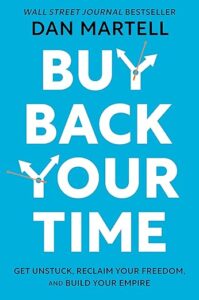
That’s a very good thing, because what happens is when you pre-announce that you’re going to do something, and there’s something to be said for saying, “Hey, I’m going to run a marathon,” getting that social pressure on you because now you’ve committed in public to do it. But this is different. This is like, “Hey, I just won the lottery,” or whatever, or I just got to this wonderful blessing, and it hasn’t fully materialized yet or become public, keep it under wraps; otherwise, you’re inviting what some call the evil eye, or jealousy.
This envy, jealousy energy is toxic, and it’s a powerful energy. It’s not just some woo-woo stuff that can actually affect you. No, it really can. You’ve got to keep things under wraps as much as possible, and you get showered with these amazing blessings. Don’t just shout it to the world and be all “humble brag” about it.
I like it very much.
You mentioned earlier that you spend 60 minutes a day reading. What are some of the most impactful books and learnings you got from all this reading you’ve been doing?
Well, I’m reading a book right now, which is crazy good. I’m probably 70% through. It’s called Buy Back Your Time.
Dan Martell, right?
Yeah, somebody sent it to me. I did a podcast recording for somebody, and they sent me the book, and it’s good. I think it’s a wonderful book for entrepreneurs at every level, but especially if you’re getting started. I think it’s valuable. Obviously, right now, that book has impressed me. It depends on what we’re talking about, but in terms of business, I still believe one of the greatest business books I’ve ever read was Good to Great.
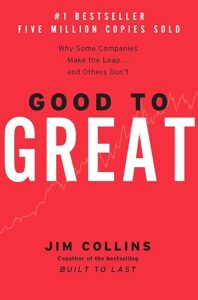
But from the be-do-have we’re talking about, David Hopkins wrote a book, Power vs. Force, which I probably read 15 or 17 years ago, helped me understand the concept of being, of being the person that you need to be, or you want to be, and how you can actually calibrate your energy as a human being. It was mind-blowing. If you get around most very successful people- not all, but most- I always find they have really good energy. You feed off that energy. It feels good. You like to be around them, right?
Because you’re getting charged up from their energy. When you get around somebody that is negative, and we’ve all been there that it’s like they suck the life right out of you. It’s true, they’re taking your energy because they need energy. They’re taking your energy. When I read that, I started to understand the idea of human beings, depending on what we’re thinking, right, or who we are in the moment.
How you’re feeling is energy. So giving, to me, is like getting low energy, giving high energy, right? It is true. It’s like you went with some, and we’re built that way. It’s innate in all human beings. When you do something for somebody else, out of the goodness of your heart, you feel better. Makes the old saying, “The Giver gets the most.” I don’t care whether it’s buying somebody a coffee, holding the door open for somebody, letting somebody get in front of you on the road because they’re pulling out whatever it is like, these are all crazy little things that have no impact in our life at all, but make us feel better.
Well, I would say that it has a huge impact on your life. Because of the adage, “How you do one thing is how you do everything.” If you’re the kind of person who lets other people in because a lot of traffic behind you, and good luck for them getting in otherwise, and so you let them pull in in front of you, that’s how you are in life. That’s not just a one-off.
Very good point. At the end of the day, why don’t we want to do things that make us feel good? It comes back to the “inspire and impress” concept. It’s all about you. Well, if holding the door for somebody makes you feel better, why wouldn’t we always do that? That’s the whole idea of the whole giving concept. I always say it’s easy to talk about, and harder to do, in some cases, right? Because we get caught up in the world. That’s why the living legacy is so critical, because it keeps reminding me, “Oh, I’m off track a little bit right now. I can’t believe it. I probably didn’t handle that situation properly.”
By the way, you said you liked my idea of sharing it with the world. What exactly would you be willing to commit to sharing with me and to our listeners so that they could implement some piece of your living legacy document?
The giver gets the most.
Okay, here’s what I’m going to do. I have my first call next week with the living legacy people I’m working with. Every year, I sort of try to upgrade and redevelop the tools. I was working this morning on how to do R&R time. So the document will be complete tomorrow. I’m making it a little better than it was before. I’m always trying to improve every year. I’ll provide you with that document when it’s done, and then I’ll also provide you with another document. The R&R time is about how and when to do R&R time, but it doesn’t require you to fill anything out. Then, I’ll also provide you with the first document where they do the work, so I’ll make sure that you get those.
Thank you. That’s all.
Once they’re updated, I’ll give you the final version; then, you can send them out to everybody.
That’s great. Thank you so much. That’s very generous of you. So I know we’re getting close to time. I want to circle back to this thing about David Hawkins and the vibration levels of different kinds of emotions, like giving versus taking. That’s called the Hawkins scale. If you read his book Power vs Force, he explains how to do muscle testing on yourself, and then you can actually muscle test what your Hawkins scale number is, how you’re vibrating.
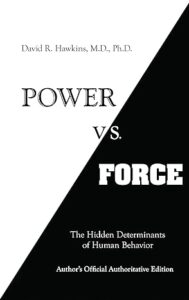
You might feel like you’re in a pretty good place, but when you muscle test yourself, it’s like, “Oh, that’s not that great of a number.” Or conversely, it’s a much higher number than you thought. Anyway, so what gets measured gets managed. I’ve heard that several times. This idea, I think, is valuable for measuring and then making some improvements.
Let’s say that you get the score after you muscle test yourself, and you want it to be higher, you meditate, pray, or ask God to increase the number, and then you muscle test again, and now it’s improved. It’s a higher number. Now you get out and do life. I’m curious if you’ve done anything like that.
I have not. I’ve never done the muscle test. It’s funny for me. It’s like a feeling. I probably should do the muscle test, but some days I’m going through, I start struggling for whatever reason, I’m not in a great place for whatever is going on. And by the way, they’re few and far between now and how they used to be. It’s maturity evolution, I don’t know. But again, when you do the living legacy, you move more towards the person you want to be.
Most of it is not about things, as you can see from some of the stuff, but mostly about who you want to be. That I can tell it’s a switch. To me, I always read it as a light switch. If I’m warm in a bad place, sometimes it takes a little while to realize it, and then suddenly think for myself. I don’t like how my body feels right now, and I feel a little stressed or anxious. I know there’s something wrong. None of that happens. I know there’s something wrong.
Or cold hands as you get off a stage, wondering exactly how well that went?
My theory is that I can flip the switch. I just have to realize what’s going on in my head, like, “Who am I being right now,” and then find a better state of being or another emotion. I call it flipping the switch. But again, awareness is the first step in change. Unfortunately, a lot of people are never aware of it. More so, now I’m more aware of it quicker, if that makes sense.
That’s awesome. This is a great way to end this episode. I would love for our listeners to get your website and your social, or where should we send them, they can learn more from you and even sign up for your coaching if they’re in the real estate industry.
Sure, we’ve coached a number of other people from Israel. We’ve done quite a bit of coaching globally, mostly in Canada. By the way, the easiest way is to go to richardrobbins.com. Everything is there. Just go to the website, and the social sites and podcast are there. That’s the hub, and it’s absolutely the easiest way.
Awesome.
Well, Stephan, this was fun. Thank you so much for having me on.
This was fun and inspiring. You inspired. You didn’t impress. I mean that in the nicest way.
Thank you.
And thank you, listeners, so get out there, inspire instead of impress, and make it a great week. We’ll catch you in the next episode. I’m your host, Stephan Spencer.


